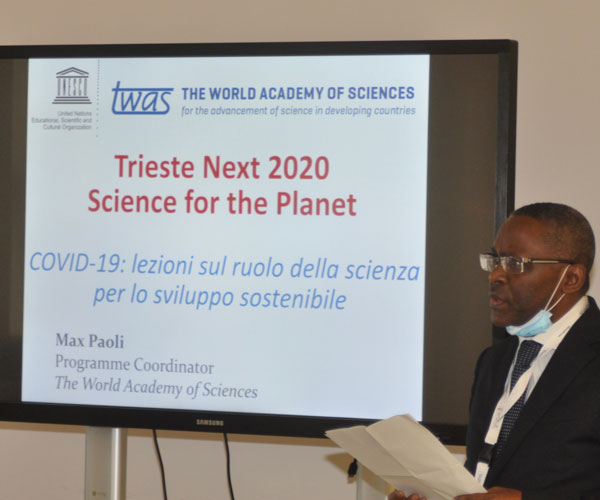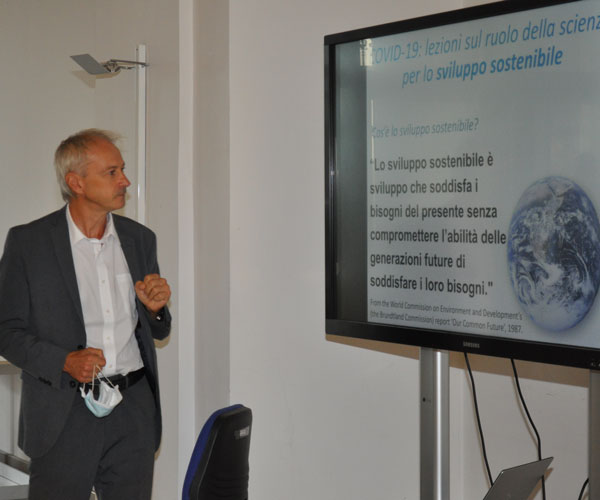
How many households have basic handwashing facilities in the Democratic Republic of Congo? And how many in Nigeria? How many hospital beds per 10,000 inhabitants are there in Tanzania compared to UK?
These are not idle questions, considering the importance that hygienic measures have regarding the COVID-19 pandemic. They reveal how problems that apparently affect only a few countries are, in fact, shared by many. They also show how urgent it is that such problems are addressed, and hopefully solved, at the global level.
These examples were used to introduce the UN Sustainable Development Goals (SDGs) at the TWAS interactive workshop "Are you ready to build your future?", one of the opening events at the international science festival Trieste Next (25-27 September 2020). This year’s was the 9th edition of the festival, dedicated to "Science for the planet: 100 proposals for our future life". About 20 high school students from the Istituto Tecnico Statale Alessandro Volta in Trieste attended the TWAS event, which was held in the Sala delle colonne of Palazzo della Regione, Piazza Unità in Trieste, kindly made available by the Friuli Venezia Giulia region and well-equipped with anti-COVID-19 measures.
"You have certainly heard of climate change, of water scarcity, and of the need to provide access to healthy food to the perhaps 11 billion people who will populate the planet in 2100," said TWAS Executive Director Romain Murenzi in his welcome address to the audience. "Therefore I ask you: are you ready to build your future? This is a provocative question because we are living in times where urgent actions are needed to grant our long-term survival on Earth and because you are our present and our future: future leaders and future world citizens, and the best audience for our work and our message."
During a keen description of the 17 UN Sustainable Development Goals Max Paoli, event organiser and TWAS Programme Coordinator engaged the students through the interactive app Mentimeter. He moved from the COVID-19 pandemic to explain that many problems are not restricted to one or two neighbouring nations. Rather, they cross borders and cultures, affecting wider areas.
"Developing countries face several hurdles that slow down their social and economic growth, including political instability, energy, diseases, poor agricultural resources, overcrowding, poverty, and unemployment," Paoli observed.
"People tend to think that urgent problems are restricted to diseases, pollution, and water and food, to name the most important" Paoli explained. “This is why it's important that we disclose new perspectives and bring our future citizens to acknowledge how issues like education, gender equality, and partnerships are part of the same picture and cannot be second to others."
And to better exemplify the interconnectedness of all the SDGs, Paoli showed a chart whereby it is clear how global warming is causing extreme climate events that jeopardize the agricultural systems in many developing countries. This in turn is forcing people to leave rural areas and move to cities, creating social instability and overcrowding.
"Our students were very happy with the event that TWAS has organised because it offered interesting insights on topics that we all should be more informed about," said Fabio Crisma who teaches electronics at Istituto Volta. "And Mentimeter was a precious tool because it kept the students' attention alive."
"Teaching young students the difference between the impact of renewable and non-renewable energy and how important it is to respect the environment and waste fewer goods is the key to build aware citizens who may act for the benefit of their communities," observed Alessandro Strogna, one of the students.
Strogna was echoed by his friend Grisel Koci, who expressed satisfaction for the decrease in CO2 levels during the COVID-19 lockdown. A sign that shows how anyone can contribute to improving everybody's life.
In his closing remarks, Professor Murenzi showed the students a 3D prism with the 17 SDGs, and he emphasized the importance of science in their implementation.
Cristina Serra

